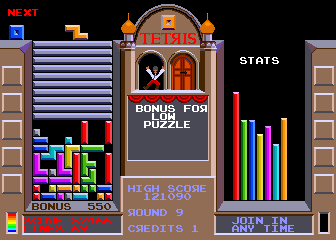Time Shenanigans in English
'Winning' is pretty much the whole point in most games. Winning is where the game ends, you beat the other team, beat the boss, beat the challenge... But it doesn't always end there.
You win for a moment, not permanently. And this might get exploited or not, as you'd want to keep winning at Rocket League, but are probably not very interested in replaying a Doom ten times in a row.

Kill 'em all!
Let's start off with the most obvious and popular: exploitation of competitiveness. The first video game ever drives people to play exactly this way. It's just a pixel bouncing off some sticks, but people keep playing to beat their opponent (though it was most common to play alone, but that's for later).

You kick some ass and wanna go back kick some more, you get your ass kicked and wanna go back to kick theirs. It all rounds up to a very addictive factor.
Curious and persistent
This happens in games with several endings or pathways. Telltale Games' Walking Dead was big on this, you'd see all these people uploading their first shot, and then another one taking the opposite direction. These games thrive on the what-if's and hook you up into finding out.

It also works out in games with some achievements, percentages or unlockables where you'd have to play the game a number of times in order to get to a secret or to get something.
Outscoring your outscore
This one is kind of special, think any casual games. Tetris, Pac-Man, Sudoku, whatever you play many times on your own, you play to outscore yourself. It's a form of competitiveness itself, but it deserves to be differentiated because of how personal it actually is.

Outcompeting some rando, or even a friend, is not the same as competing with yourself. Yeah, I know, captain Obvious. What I mean is this one is about the exploitation of fulfillment. When winning over others, it's not an uncommon occurrence to reach a 'yeah, so?' state. A lot of people will jump out of a game and say they just got bored of the competitiveness.
Winning over yourself implies betterment, when you defeat yourself you no longer identify with the looser, but with the winner. This is why absurdly challenging solo games do well, it's all about ✨the pursuit of personal growth✨ 🪣 here, you can throw up.
The Reality
Most games actually work on a mix of all this, most don't fall into a single category because they're all very good strategies for engagement. Be wary to pick you own poison, but also wait for the nice part, it might turn out to be a good thing!
| All images used on this post are my own unless stated otherwise. |
|---|

Absurdos de Tiempo en Español
"Ganar" es básicamente en torno a lo que giran la mayoría de los juegos. Ganar es el final del juego, derrotas al otro equipo, matas al jefe, pasas el reto... Pero no siempre termina ahí.
Ganas por un momento, no para siempre, y eso es muy explotable. Normalmente quieres seguir ganando en Rocket League, pero probablemente no te llame demasiado rejugar un Doom diez veces seguidas.

Acaba con ellos
Es la más obvia y la más vista: la explotación de la competitividad. El primer videojuego e la historia se trata casi exclusivamente de eso. No es más que un píxel rebotando en unas rayas, pero la gente sigue jugando para ganar (aunque lo más habitual era jugar solo, pero ya va).

Pateas algunos culos y quieres volver a patear otros tantos, te patean el culo y quieres volver a devolverles el favor. Todo muy bonito en un factor muy adictivo.
Intriga y persistencia
Esto ocurre en juegos con varios finales o caminos. Era la base de, por ejemplo, el Walking Dead de Telltale Games, un montón gente subiendo su primer run, y luego otro tomando la dirección opuesta. Estos juegos prosperan con el ¿y si...? y te enganchan para averiguarlo.

También funciona en juegos con algunos logros, porcentajes o desbloqueables que tendrías que jugar varias veces para llegar a un secreto o conseguir algo.
Superando lo superado
Aquí ya se pone un pelo místico, piensa en cualquier juego casual. Tetris, Pac-Man, Sudoku, cualquiera al que juegues muchas veces por tu cuenta, lo haces para superarte a ti mismo. Es realmente una forma de competitividad, pero merece su propio espacio por lo personal que es.

No es lo mismo competir con un gafo aleatorio, o incluso con un amigo, que con uno mismo. Sí, lo sé, Capitán Obvio. Quiero decir es que ésta es la explotación de la satisfacción. Cuando le ganas a los demás, no es raro que llegues al ajá, ¿y?. Mucha gente se ladilla de un juego y dicen que se aburrieron de la competitividad.
Ganarte a ti mismo implica mejora, cuando rompes tu propio record no te identificas con el perdedor, sino con el ganador. Por eso los juegos single-player absurdamente difíciles van bien, se trata de ✨la búsqueda del crecimiento personal✨ 🪣 toma para que te vomites.
La Realidad
La mayoría de los juegos funcionan con una mezcla de todo esto, no caen en una sola categoría porque todas son excelentes estrategias para atrapar al jugador. Ten cuidado eligiendo tu propio veneno, pero también espera la parte buena, siempre puede salir bien.
| Todas las imágenes utilizadas en este post me pertenecen, a menos que establezca lo contrario. |
|---|